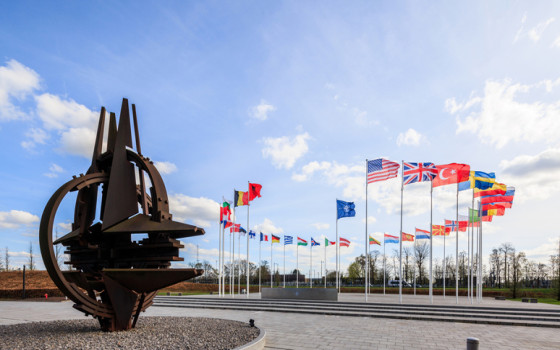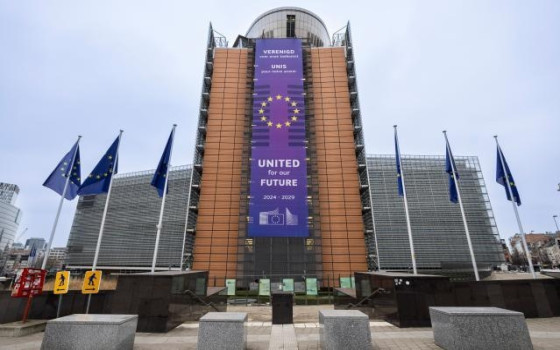EU and NATO meetings discuss security guarantees for Ukraine that European countries will provide in coordination with Washington.. A catastrophic scenario of territorial concessions.. and fears of a game of expectations

- Europe and Arabs
- Tuesday , 19 August 2025 10:36 AM GMT
Brussels: Europe and the Arabs
Trump intensified his pressure on Zelenskyy as reports circulated of a disastrous land swap scenario that could see Ukraine surrender its vital fortified positions in the Donbas in exchange for small chunks of Russian-held territory. Things look very different now, writes Jamie Dittmer in an indispensable post-summit analysis, as published in Playbook, the European edition of Politico. German Chancellor Merz told reporters that a territorial swap wasn't even discussed during Monday's talks, but security guarantees were definitely on the table. Trump emphasized that America would provide Ukraine with "excellent protection and security." British Prime Minister Keir Starmer told Sky News that there had been "real progress" in Trump's thinking, describing it as an "Article 5-like guarantee." He likely meant Article 5 of the NATO treaty, which requires any member state to protect itself in the event of an attack. Under the heading "Warning," the magazine added: Trump said that the actual guarantees would be provided by European countries—but, importantly, it would be "in coordination" with Washington. Later, NATO Secretary General Mark Rutte told Fox News that 30 countries were part of the so-called coalition of the willing. The work has begun: The alliance's defense chiefs are expected to meet this week (possibly today) to begin finalizing details of the security guarantees, according to three European officials who spoke to our colleagues. Zelensky told the press that "it will be added." “These assurances will be formalized on paper within the next week to ten days.”
Will Putin attend? Meanwhile, US Secretary of State Marco Rubio is leading coordination efforts to prepare for a face-to-face meeting with Zelenskyy and Putin. The Russian president has repeatedly rejected invitations to meet Zelenskyy, seeking to avoid negotiating directly with a leader he describes as illegitimate. But Trump wants a bilateral, immediately.
Wait for the Donald: On Monday, Trump kept Zelenskyy and the Europeans waiting while he called Putin for a 40-minute conversation. In that conversation, Trump believes Putin agreed to meet Zelenskyy. (Side note: Finland’s Stubb told CNN that Trump’s decision to call Putin was “coordinated” with the Europeans and Zelenskyy, with Trump “testing” the “duo” idea.)
This isn’t entirely conclusive. The Kremlin’s statement on the Trump-Putin call was typical evasiveness. Yuri Ushakov, Putin’s top foreign policy advisor, told Russian state media: “Vladimir Putin and Donald Trump expressed support for the continuation of the… Direct negotiations between the Russian and Ukrainian delegations. “The idea was discussed that it would be advisable to explore the possibility of raising the level of representatives of the Ukrainian and Russian sides.” Translation: Maybe, certainly.
But this does not diminish Trump’s chances of reaching an agreement with Putin. The US president was filmed addressing French President Emmanuel Macron via hot microphone: “I think he wants to make a deal for me, do you understand that?” Despite his madness. When Macron was asked about it, he told NBC News: “Your president is very confident in his ability to make this deal with President Putin, and that’s fantastic.”
Quick reaction
Let the videoconferences begin: EU ambassadors gathered at 1 a.m. for a quick meeting. Just 12 hours later, their top leaders are scheduled to enter a virtual EU meeting at 1 p.m. Central European Time.
The EU was fooled twice, shame on the EU: But is all this relief the next day misplaced? Matthias Matthys, a senior fellow for Europe at the Council on Foreign Relations, argues that Trump is playing the expectations game, and Europe is constantly fooled. He writes that Europeans’ high expectations are shattered “usually by Trump’s social media posts or some interview he gives.” “Then when they meet again, after avoiding the worst outcomes, they reach some kind of agreement.”
The shocking surprise: “The situation is better than they feared, but always worse than the status quo.”
Flirting with entanglements: The opposite view comes Almost from Christine Berzina, a senior fellow at the German Marshall Fund, who argues that the United States is “not signaling a retreat from the European arena,” but rather “flirting with greater entanglement on the European continent.” Berzina asserts that discussing “integrating Ukraine into a new European and transatlantic security framework” could be a radical shift.
It may actually be just one big business deal: According to a report in the Financial Times, Kyiv presented Trump with a plan that would have seen Ukraine spend €100 billion on US weapons—with European financing—in exchange for security guarantees.
Why Donbas Matters: It’s not just the moral hazard of rewarding Putin for launching his full-scale invasion. The danger of abandoning Donbas is that it could destroy Kyiv’s ability to defend the rest of Ukraine from future attacks. This is the lesson of the 1938 Munich Resolution, which forced Czechoslovakia to cede the Sudetenland, paving the way for total Nazi control.














No Comments Found